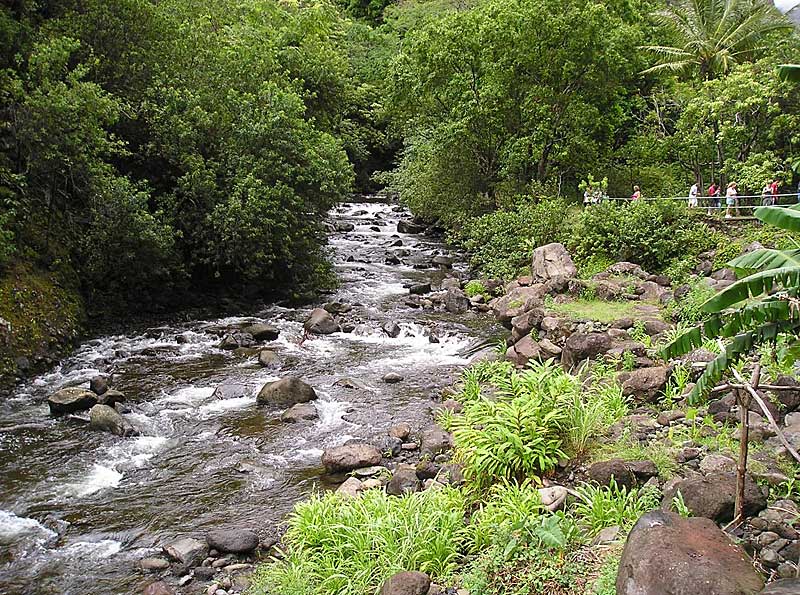Citizens Take Action To Increase Flows In Maui’s “Four Great Waters”
Plantation closure provides opportunities for more sustainable and just agriculture
Contact
Today, Maui community groups Hui o Nā Wai ʻEhā and Maui Tomorrow Foundation, represented by Earthjustice, filed a legal petition to the state Commission on Water Resource Management (“Water Commission”) to increase the flows in Nā Wai ʻEhā—Maui’s “Four Great Waters” of Waiheʻe River, Waiehu Stream, Wailuku River, and Waikapū Stream—based on the recent announcement by Alexander & Baldwin, Inc. (“A&B”) that it will shut down its Hawaiian Commercial & Sugar (“HC&S”) plantation by year’s end. As the petition explains, HC&S is the predominant user of up to 80 percent of Nā Wai ʻEhā stream flow diversions, and moving to more sustainable agriculture will mean using less water and leaving more flows in the rivers and streams to restore native ecosystems, revitalize local communities and Native Hawaiian culture, and recharge public drinking water aquifers.
Basemap modified from U.S. Geological Survey digital data, National Hydrography Dataset
Map of the “Four Great Waters” of Maui. (View larger)
“While our hearts go out to the plantation workers affected by HC&S’s closure, we also look forward to the opportunity to right past wrongs and chart a new future for Nā Wai ʻEhā,” said John V. Duey, President of Hui o Nā Wai ʻEhā. “Nā Wai ʻEhā stream flows are a public trust for all the people, and it’s time to embrace this kuleana (responsibility) in the 21st century.”
“I grew up in a Hawaiʻi where ‘sugar was king,’” said Maui Tomorrow Executive Director Albert Perez. “This petition recognizes that times have changed and we have an opportunity to rebalance our water distribution to reflect current conditions. We desperately need increased stream flows to restore our declining fisheries, recharge the aquifers that supply most of Maui residents with water, and support more food production from small farms in the fertile lands of Nā Wai ʻEhā. With transition to the right kind of farming practices and crops on HC&S land, there would be enough water for all, and all water would be well used.”
Historically, Nā Wai ʻEhā has been diverted by two companies, HC&S and Wailuku Water Company (“WWC”), the former Wailuku Sugar plantation that now uses the plantation ditch system to sell diverted stream flows to the public, including the County of Maui. Earthjustice originally petitioned in 2004 to restore Nā Wai ʻEhā stream flows and took the case all the way to the Hawaiʻi Supreme Court, which ruled in 2012 that the Water Commission failed to adequately protect public and Native Hawaiian rights to flowing streams. In 2014, a settlement restored partial flows to all four of Nā Wai ʻEhā, while accommodating HC&S’s ongoing plantation water uses for almost 5,000 acres in Central Maui.
Now, HC&S’s closure presents new circumstances that the Water Commission must address in fulfilling its ongoing public trust duties to restore stream flows to Nā Wai ʻEhā. A similar shift occurred in the Waiāhole Ditch case on Oʻahu, where the close of the sugar plantation and conversion to diversified agriculture resulted in substantial flows being returned to Windward Oʻahu streams.
“HC&S’s closure is a ‘game changer’ that compels a new, hard look at Nā Wai ʻEhā’s and Maui’s water future,” said Earthjustice attorney Summer Kupau-Odo. “We support efforts to find a new, sustainable model for Maui agriculture that facilitates restoring flows to public rivers and streams. The water was never A&B’s and WWC’s property to take as they see fit, and they cannot continue to ‘bank’ it.”

Additional Resources
About Earthjustice
Earthjustice is the premier nonprofit environmental law organization. We wield the power of law and the strength of partnership to protect people's health, to preserve magnificent places and wildlife, to advance clean energy, and to combat climate change. We are here because the earth needs a good lawyer.